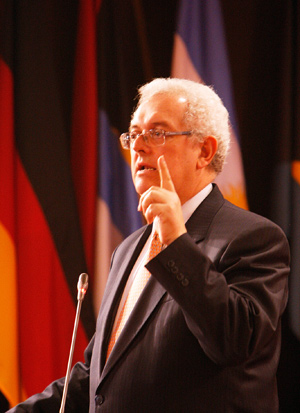"Economic Growth is, above all else, a Process of Structural Change"
Former Executive Secretary of this United Nations regional commission delivered the Tenth Raúl Prebisch Memorial Lecture.

(12 April 2011) "Economic growth is, above all else, a process of structural change, as this is the only way that countries can successfully tackle external vulnerability", this was according to José Antonio Ocampo, former Executive Secretary of the Economic Commission for Latin America and the Caribbean (ECLAC), speaking during the Tenth Raúl Prebisch Memorial Lecture at the ECLAC headquarters in Santiago, Chile.
The Columbia University Professor (United States) gave a presentation on "Macroeconomics for development: countercyclical policies and changing production patterns" in front of an audience of academics, international officials and representatives of the diplomatic corps.
He was introduced by Alicia Bárcena, current Executive Secretary of ECLAC, who highlighted the contribution of Ocampo to the development of Latin American economic thought: "Many of the ideas and propositions produced by ECLAC during his tenure (1998-2003) have remained prevalent, as they planted the seeds for the proposal we recently presented to the region's governments in the document Time for equality: closing gaps, opening trails.
"No one can claim these propositions are not topical and relevant", assured Bárcena.
In the Memorial Lecture, José Antonio Ocampo argued that the key to the right macroeconomics for development is a combination of good countercyclical policies and an active production diversification strategy. In his opinion, the three pillars that support Latin American economies are: countercyclical policies, changing production patterns and development financing.
He stated that Latin America has put the idea of countercyclical policies at the heart of the public agenda, and that it now forms part of policy rationale in the world of economics: "ECLAC has won the intellectual debate. The ideas we defended 20 years ago are those being put into practice today".
He recalled how the fashionable idea of using prudential regulations for specific macroeconomic purposes (macroprudential rules) was introduced by ECLAC in around 1999-2000.
In order for Latin America to rise to the challenge of tackling a post-crisis economy, characterized by high volatility and new capital inflows, Ocampo underscored the importance of countercyclical measures (using structural rules), fiscal policy measures and social protection mechanisms (such as unemployment subsidies).
He did, however, acknowledge the difficulty of combating the political pressures of boom and bust, and said that countries have often resorted to procyclical responses (spend during the good times and save during the bad), which is not always the most advisable option.
In terms of monetary and exchange-rate policy, he highlighted the role of central banks: "They must have at least three goals: to control inflation, curb the exchange rate cycle and promote economic activity".
"The exchange rate has to be an obsession of the monetary authorities, but it cannot replace productive development policies. They too must be used to choose the sectors to be promoted by a country", he stated.
Lastly, Ocampo emphasized what he considered to be the two main contributions of former ECLAC Executive Secretary Raúl Prebisch, who had been honoured in this way since 2001: the key role of managing external vulnerabilities in economies that are dominated by the balance of payments in their macroeconomic dynamics, and the close link between economic growth and changing production patterns.
"These two main ideas remain as relevant today as they were then, and demonstrate the validity of concepts that ECLAC has defended throughout its history", he pointed out.
In Colombia, José Antonio Ocampo held posts including Minister of Finance and Public Credit and Chair of the Board of Banco de la República (Colombia's central bank).
During his impressive career, he has also been United Nations Under-Secretary-General for Economic and Social Affairs and a Director of the Project on "Agenda for a Citizens' Democracy in Latin America" involving the United Nations Development Programme (UNDP) and the Organization of American States (OAS).
Any queries should be addressed to the ECLAC Public Information and Web Services Section.
E-mail: dpisantiago@cepal.org; telephone: (56 2) 210 2040.
Related content
Conferencia dictada por José Antonio Ocampo "Macroeconomía para el desarrollo: políticas anticíclicas y transformación productiva". Décima Cátedra Raúl Prebisch
Por Alicia Bárcena, Secretaria Ejecutiva de la CEPAL
Contact
Public Information Unit
- prensa@cepal.org
- (56 2) 2210 2040